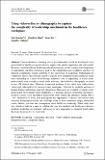Files in this item
Using video-reflexive ethnography to capture the complexity of leadership enactment in the healthcare workplace
Item metadata
| dc.contributor.author | Gordon, Lisi Jane | |
| dc.contributor.author | Rees, Charlotte | |
| dc.contributor.author | Ker, Jean | |
| dc.contributor.author | Cleland, Jennifer | |
| dc.date.accessioned | 2017-01-04T16:30:19Z | |
| dc.date.available | 2017-01-04T16:30:19Z | |
| dc.date.issued | 2017-12 | |
| dc.identifier | 248458206 | |
| dc.identifier | 59679141-64d9-4dec-b28d-441a6322956b | |
| dc.identifier | 85007496585 | |
| dc.identifier | 000414164400005 | |
| dc.identifier.citation | Gordon , L J , Rees , C , Ker , J & Cleland , J 2017 , ' Using video-reflexive ethnography to capture the complexity of leadership enactment in the healthcare workplace ' , Advances in Health Sciences Education , vol. 22 , no. 5 , pp. 1101-1121 . https://doi.org/10.1007/s10459-016-9744-z | en |
| dc.identifier.issn | 1382-4996 | |
| dc.identifier.other | ORCID: /0000-0002-4986-1501/work/56523511 | |
| dc.identifier.uri | https://hdl.handle.net/10023/10040 | |
| dc.description | This research was part of LG’s Ph.D. research which was generously funded by NHS Education for Scotland through SMERC. | en |
| dc.description.abstract | Current theoretical thinking asserts that leadership should be distributed across many levels of healthcare organisations to improve the patient experience and staff morale. However, much healthcare leadership education focusses on the training and competence of individuals and little attention is paid to the interprofessional workplace and how its inherent complexities might contribute to the emergence of leadership. Underpinned by complexity theory, this research aimed to explore how interprofessional healthcare teams enact leadership at a micro-level through influential acts of organising. A whole (interprofessional) team workplace-based study utilising video-reflexive ethnography occurred in two UK clinical sites. Thematic framework analyses of the video data (video-observation and video-reflexivity sessions) were undertaken, followed by in-depth analyses of human–human and human–material interactions. Data analysis revealed a complex interprofessional environment where leadership is a dynamic process, negotiated and renegotiated in various ways throughout interactions (both formal and informal). Being able to “see” themselves at work gave participants the opportunity to discuss and analyse their everyday leadership practices and challenge some of their sometimes deeply entrenched values, beliefs, practices and assumptions about healthcare leadership. These study findings therefore indicate a need to redefine the way that medical and healthcare educators facilitate leadership development and argue for new approaches to research which shifts the focus from leaders to leadership. | |
| dc.format.extent | 21 | |
| dc.format.extent | 923475 | |
| dc.language.iso | eng | |
| dc.relation.ispartof | Advances in Health Sciences Education | en |
| dc.subject | Leadership | en |
| dc.subject | Leadership education | en |
| dc.subject | Video-reflexive ethnography | en |
| dc.subject | Interprofessional | en |
| dc.subject | Complexity theory | en |
| dc.subject | HD28 Management. Industrial Management | en |
| dc.subject | NDAS | en |
| dc.subject | SDG 3 - Good Health and Well-being | en |
| dc.subject.lcc | HD28 | en |
| dc.title | Using video-reflexive ethnography to capture the complexity of leadership enactment in the healthcare workplace | en |
| dc.type | Journal article | en |
| dc.contributor.institution | University of St Andrews. School of Management | en |
| dc.identifier.doi | 10.1007/s10459-016-9744-z | |
| dc.description.status | Peer reviewed | en |
This item appears in the following Collection(s)
Items in the St Andrews Research Repository are protected by copyright, with all rights reserved, unless otherwise indicated.

